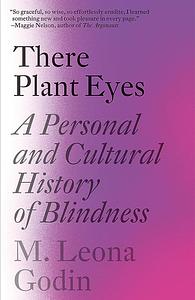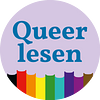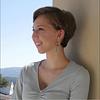Take a photo of a barcode or cover
This was a super interesting read and I learned a lot. The first chapters where about ancient literature and I haven‘t read those books so it was a little hard to understand for me without knowing the books. I also skipped the chapter about Milton and his book Paradise Lost a little due to the same reason. But after that the more modern history of blindness was so interesting I couldn’t stop reading. I learned a lot about schools for the blind, stereotypes of blind people in the media, the invention of Braille, the deafblind icon Helen Keller, science, technical stuff, music and so much more.
The second half also contained more personal elements so it wasn’t as academic and easier to read compared to the first chapters.
The second half also contained more personal elements so it wasn’t as academic and easier to read compared to the first chapters.
This book was fantastic! Everything I wanted from a book on this topic—and then some! There Plant Eyes: A Personal and Cultural History of Blindness weaves M. Leona Godin's personal journey of gradually losing her sight through a cultural examination of blindness as metaphor, meme, and figure.
While There Plant Eyes might be said to function as a biography and general 101 on the cultural history of blindness, underneath its narrative structure is a continuous flow of conversation with not only academic theory but what it means to exist expansively as a blind person. Godin utilizes her academic background in early modern literature to connect classics with disability theory and activism. I absolutely understand why other reviews of this book make mention of the desire to write after reading this. My favorite undercurrent in this was the continued references to blindness and disability being understood as expansively as gender—yes, please! I want more!
This book gets me incredibly excited for what the future of disability representation and scholarship will be in my lifetime. And I look forward to reading anything written by M. Leona Godin in the future!
While There Plant Eyes might be said to function as a biography and general 101 on the cultural history of blindness, underneath its narrative structure is a continuous flow of conversation with not only academic theory but what it means to exist expansively as a blind person. Godin utilizes her academic background in early modern literature to connect classics with disability theory and activism. I absolutely understand why other reviews of this book make mention of the desire to write after reading this. My favorite undercurrent in this was the continued references to blindness and disability being understood as expansively as gender—yes, please! I want more!
This book gets me incredibly excited for what the future of disability representation and scholarship will be in my lifetime. And I look forward to reading anything written by M. Leona Godin in the future!
challenging
funny
informative
reflective
medium-paced
informative
reflective
challenging
informative
reflective
slow-paced
Incredibly valuable read and really readable- it was very interesting and has provided a lot to reflect on. I'm very glad I read it
informative
reflective
slow-paced
(3.5 stars)
I saw this book on a reading list for disability month, and as a lover of literature and cultural studies, I figured it would be up my alley.
Overall, I found this book to have some valuable insights regarding blindness and culture, and I appreciated the way it put those concepts in conversation with the author's personal experiences. Godin uses examples from history and pop culture as a springboard for exploring broader concepts that continue to inform society's "ocularcentrism" - prioritizing sightedness as a default state. She also reflects on her own experiences and how navigating the world as a blind/visually impaired person has revealed the way society is structured around ableism.
But while a lot of this book is useful and introduces readers to challenging ocularcentrism, there are some limitations. For one, this book tries to be a lot of things at once: history, literary criticism, social science, memoir. I appreciate a good genre-defying work, but trying to cover a lot of ground also means that some analyses aren't as deep and well-explored as they could have been. For two, this book centers Western culture, and even that feels very broad. There's not really a lot of information about how disability intersects with race or sexuality or gender (though there are some nods to these topics, the umbrella of "blindness" and "western" feel extremely broad).
But maybe these limitations leave room for future scholars to add their voices. Because There Plant Eyes is so broad, it serves as a good introduction to certain topics, but isn't (or shouldn't be) the end-all be-all of disability studies.
TL;DR: There Plant Eyes is useful for getting readers to start thinking about ocularcentrism in "Western" culture, but if you plan on taking disability studies seriously, you need to build on Godin's work by reading about how disability intersects with other identities.
I saw this book on a reading list for disability month, and as a lover of literature and cultural studies, I figured it would be up my alley.
Overall, I found this book to have some valuable insights regarding blindness and culture, and I appreciated the way it put those concepts in conversation with the author's personal experiences. Godin uses examples from history and pop culture as a springboard for exploring broader concepts that continue to inform society's "ocularcentrism" - prioritizing sightedness as a default state. She also reflects on her own experiences and how navigating the world as a blind/visually impaired person has revealed the way society is structured around ableism.
But while a lot of this book is useful and introduces readers to challenging ocularcentrism, there are some limitations. For one, this book tries to be a lot of things at once: history, literary criticism, social science, memoir. I appreciate a good genre-defying work, but trying to cover a lot of ground also means that some analyses aren't as deep and well-explored as they could have been. For two, this book centers Western culture, and even that feels very broad. There's not really a lot of information about how disability intersects with race or sexuality or gender (though there are some nods to these topics, the umbrella of "blindness" and "western" feel extremely broad).
But maybe these limitations leave room for future scholars to add their voices. Because There Plant Eyes is so broad, it serves as a good introduction to certain topics, but isn't (or shouldn't be) the end-all be-all of disability studies.
TL;DR: There Plant Eyes is useful for getting readers to start thinking about ocularcentrism in "Western" culture, but if you plan on taking disability studies seriously, you need to build on Godin's work by reading about how disability intersects with other identities.
I loved this. Found it a little slow at the start but the author did such a good job of combining history and her own experiences, and loved the stuff about braille and echolation, and the abelism both of society at large, and internalised as the newly blind learn to accept the help they need. Definately recommend this
informative
lighthearted
reflective
This was fantastic - I highly recommend it! Very informative and thought provoking. Definitely intend to return to it in the future.
Only part that struck me as odd is that Godin omits the fact that Helen Keller was pro eugenics? Feels worth mentioning especially given all the great analysis of ableism in this book.
Only part that struck me as odd is that Godin omits the fact that Helen Keller was pro eugenics? Feels worth mentioning especially given all the great analysis of ableism in this book.





